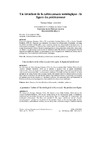Identificador persistente para citar o vincular este elemento:
https://accedacris.ulpgc.es/jspui/handle/10553/58694
| Campo DC | Valor | idioma |
|---|---|---|
| dc.contributor.author | Gerard Lojacono, Florence Yolande | - |
| dc.date.accessioned | 2019-12-16T19:09:22Z | - |
| dc.date.available | 2019-12-16T19:09:22Z | - |
| dc.date.issued | 2011 | - |
| dc.identifier.issn | 1139-9368 | - |
| dc.identifier.other | Dialnet | - |
| dc.identifier.other | WoS | - |
| dc.identifier.uri | https://accedacris.ulpgc.es/handle/10553/58694 | - |
| dc.description.abstract | Los Domingos de Tahiti (Georges Simenon, 1936), La Isla a mediodía (Julio Cortázar, 1966) e La Isla inaudita (Eduardo Mendoza, 1989) no se ajustan, a primera vista, al género denominado robinsonnade. Pero, al margen de las fictiones insulares tradicionales o post-modernas aparece una robinsonnade de un tercer tipo: la robinsonnade ontológica. El estudio de estos tres textos es un buen ejemplo de un trabajo hecho sobre un corpus mucho más amplio e ilustra la dinámica de esas novelas hasta ahora sin clasificar. En cada ficción aparece, bajo diferentes formas, un personaje con un papel de mediator entre la isla deseada y el protagonista deseoso. Este personaje clave, que llamaremos el Predecesor, forma, con el protagonista, el eje central de la robinsonnade ontológica. | - |
| dc.description.abstract | Long cours (Georges Simenon, 1936), L’Île à midi (Julio Cortázar, 1966) et L’Île enchantée (Eduardo Mendoza, 1989) ne s’imposent pas à première vue comme des robinsonnades. Et pourtant, en marge des fictions insulaires traditionelles ou post-modernes émerge une robinsonnade du troisième type : la robinsonnade ontologique. L’étude des trois textes choisis est exemplaire d’un travail effectué sur un corpus beaucoup plus vaste et illustre la dynamique de ces textes jusqu’alors inclassables. Dans toutes ces fictions, un personnage ayant un rôle de médiateur entre l’île désirée et le protagoniste désirant apparaît sous différentes formes. Ce personnage clé, que l’on appellera le Prédédesseur, forme, avec le protagoniste, l’axe central de la robinsonnade ontologique. | - |
| dc.description.abstract | The Long exile (Georges Simenon, 1936), The Island at noon (Julio Cortázar, 1966) and La Isla inaudita (Eduardo Mendoza, 1989) do not clearly belong to the robinsonnade genre. In addition to traditional and postmodern formats of insular fiction, there is a third kind of robinsonnade: the ontological robinsonnade. The three texts selected for this paper —which are part of a broader research project— provide the big picture of this narrative format, so far uncategorizable. In these insular fictions, under different versions, we can always find a character acting as a mediator between the desired island and the avid protagonist. We will call this key character the Predecessor. Both the Predecessor and the protagonist form the cornerstone of the ontological robinsonnade. | - |
| dc.language | fra | - |
| dc.relation.ispartof | Theleme-Revista Complutense De Estudios Franceses | - |
| dc.source | Thélème: Revista complutense de estudios franceses [ISSN 1139-9368] (26), p. 203-215 | - |
| dc.subject | 6202 Teoría, análisis y crítica literarias | - |
| dc.subject | 570107 Lengua y literatura | - |
| dc.subject.other | Simenon | - |
| dc.subject.other | Cortázar | - |
| dc.subject.other | Mendoza | - |
| dc.subject.other | Robinsonnade | - |
| dc.subject.other | Insularité | - |
| dc.subject.other | Prédécesseur | - |
| dc.subject.other | Insularidad | - |
| dc.subject.other | Predecesor | - |
| dc.subject.other | Insularity | - |
| dc.subject.other | Predecessor | - |
| dc.title | Un invariant de la "robinsonnade" ontologique: la figure du prédécesseur | - |
| dc.title.alternative | A permanent feature of the ontological robinsonnade: the predecessor figure | - |
| dc.title.alternative | Una constante en la robinsonnade ontologica: la figura del predecesor | - |
| dc.type | info:eu-repo/semantics/article | - |
| dc.type | Article | - |
| dc.identifier.doi | 10.5209/rev_THEL.2011.v26.12 | - |
| dc.identifier.isi | 000215459000012 | - |
| dc.identifier.url | http://dialnet.unirioja.es/servlet/articulo?codigo=3734376 | - |
| dc.identifier.eissn | 1989-8193 | - |
| dc.description.lastpage | 215 | - |
| dc.identifier.issue | 26 | - |
| dc.description.firstpage | 203 | - |
| dc.relation.volume | 26 | - |
| dc.investigacion | Artes y Humanidades | - |
| dc.type2 | Artículo | - |
| dc.contributor.daisngid | 2664935 | - |
| dc.contributor.authordialnetid | 2129613 | - |
| dc.identifier.dialnet | 3734376ARTREV | - |
| dc.description.numberofpages | 13 | - |
| dc.contributor.wosstandard | WOS:Lojacono, FG | - |
| dc.date.coverdate | 2011 | - |
| dc.identifier.ulpgc | Sí | es |
| dc.description.esci | ESCI | |
| dc.description.erihplus | ERIH PLUS | |
| item.grantfulltext | open | - |
| item.fulltext | Con texto completo | - |
| crisitem.author.dept | Departamento de Filología Moderna, Traducción e Interpretación | - |
| crisitem.author.orcid | 0000-0001-9794-6414 | - |
| crisitem.author.fullName | Gerard Lojacono, Florence Yolande | - |
| Colección: | Artículos | |
Visitas
182
actualizado el 15-ene-2026
Descargas
67
actualizado el 15-ene-2026
Google ScholarTM
Verifica
Altmetric
Comparte
Exporta metadatos
Los elementos en ULPGC accedaCRIS están protegidos por derechos de autor con todos los derechos reservados, a menos que se indique lo contrario.
